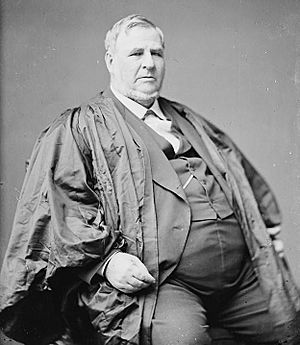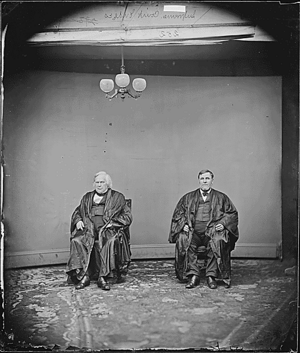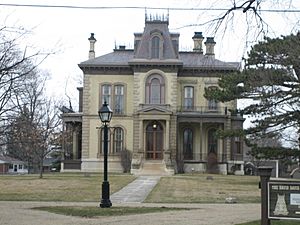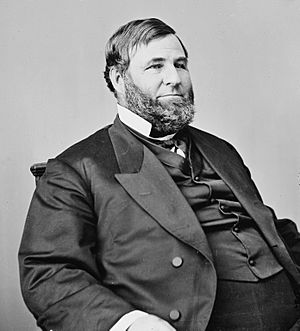David Davis (Supreme Court justice) facts for kids
Quick facts for kids
David Davis
|
|
|---|---|

Davis as a United States Supreme Court justice, c. 1877
|
|
| President pro tempore of the United States Senate | |
| In office October 13, 1881 – March 3, 1883 |
|
| Preceded by | Thomas F. Bayard Sr. |
| Succeeded by | George F. Edmunds |
| United States Senator from Illinois |
|
| In office March 4, 1877 – March 4, 1883 |
|
| Preceded by | John Logan |
| Succeeded by | Shelby Cullom |
| Associate Justice of the Supreme Court of the United States | |
| In office December 10, 1862 – March 4, 1877 |
|
| Nominated by | Abraham Lincoln |
| Preceded by | John Campbell |
| Succeeded by | John Harlan |
| Personal details | |
| Born | March 9, 1815 Cecil County, Maryland, U.S. |
| Died | June 26, 1886 (aged 71) Bloomington, Illinois, U.S. |
| Political party | Whig (Before 1854) Republican (1854–1870) Liberal Republican (1870–1872) Independent (1872–1886) |
| Spouse | Sarah Woodruff Walker (1838–1879) |
| Relations | David Davis IV (great-grandson) |
| Children | 2 |
| Education | Kenyon College (BA) Yale University (LLB) |
| Signature | |
David Davis (March 9, 1815 – June 26, 1886) was an important American politician and judge. He served as a U.S. senator for Illinois and as an associate justice of the United States Supreme Court. He also managed Abraham Lincoln's campaign at the 1860 Republican National Convention, helping Lincoln win the presidential nomination.
Born into a wealthy family in Maryland, Davis studied at Kenyon College and Yale University. He later moved to Bloomington, Illinois, in the 1830s to practice law. He served in the Illinois legislature and as a state judge. After Lincoln became president, he appointed Davis to the United States Supreme Court. Davis served there until 1877.
Davis wrote the main opinion in Ex parte Milligan, a key court decision that limited the military's power to try regular citizens in its courts. In 1872, he was nominated for President by the Labor Reform party. He also tried to get the Liberal Republican Party's nomination but lost to Horace Greeley. Even so, he received one electoral vote in the 1872 presidential election.
Davis played a big part in creating the 1876 Electoral Commission. This group was formed to solve the disputed Hayes v. Tilden presidential election. Many expected Davis to be the deciding member. However, the Illinois State Legislature elected him to the U.S. Senate, which made him step down from the Supreme Court and the Commission. A Republican was then appointed in his place, which helped Rutherford B. Hayes win the election.
Because of his independent nature, Davis was elected president pro tempore of the United States Senate from 1881 to 1883. This position placed him first in the line of presidential succession. This was important because the Vice President's office was empty after President James A. Garfield was assassinated in 1881. Davis chose not to run for re-election in 1882 and retired from public life in 1883.
Contents
Early Life and Education
David Davis was born into a wealthy family in Cecil County, Maryland. He went to public school there. After finishing his studies at Kenyon College in Gambier, Ohio, in 1832, he continued to study law in Massachusetts and at Yale University.
Career Highlights
Becoming a Lawyer and Judge
After graduating from Yale in 1835, Davis moved to Bloomington, Illinois. There, he started his law practice. Davis served in the Illinois House of Representatives in 1845. He was also a delegate to the Illinois constitutional convention in McLean County in 1847. From 1848 to 1862, Davis was a judge for the Illinois Eighth Circuit Court. This was the same circuit where his friend, lawyer Abraham Lincoln, worked.
Davis was a delegate at the 1860 Republican National Convention in Chicago. He was Abraham Lincoln's campaign manager during the 1860 presidential election. He helped Lincoln win the nomination over other candidates. After President Lincoln was assassinated, Judge Davis helped manage his estate.
Serving on the U.S. Supreme Court

On October 17, 1862, President Lincoln appointed Davis as an associate justice of the Supreme Court. He replaced John Archibald Campbell, who had resigned. Davis was officially nominated on December 1, 1862. The United States Senate confirmed him on December 8, 1862. He took his judicial oath on December 10, 1862.
On the Court, Davis became well-known for writing a very important decision. This was in the case of Ex parte Milligan (1866). In this case, the court overturned a death sentence given by a military court during the Civil War. The sentence was for a civilian named Lambdin P. Milligan. Milligan had been found guilty of causing an uprising.
The Supreme Court decided that if regular courts were working, a military court could not try a civilian. This decision strongly spoke out against military power over citizens. It became a key part of protecting American civil liberties.
In another case, Hepburn v. Griswold (1870), he disagreed with the majority of the Supreme Court. The majority ruled that Congress's actions making government notes legal tender for debts were unconstitutional. Davis is the only Supreme Court justice with no known connection to any religious group.
Davis was asked to become Chief Justice but he refused. In February 1872, the Labor Reform Convention nominated him for President. Their platform supported a national currency and an eight-hour workday. Davis said that the presidency "should neither be sought nor declined by any American citizen."
He later withdrew from the presidential race. He did not get the Liberal Republican Party nomination, which went to editor Horace Greeley. Greeley died after the popular election but before the electoral votes were counted. One of Greeley's electoral votes then went to Davis.
The Hayes-Tilden Election Commission
In 1877, Davis almost had the chance to decide who would be the President of the United States. The Presidential election of 1876 was disputed between Republican Rutherford B. Hayes and Democrat Samuel J. Tilden. Congress created a special Electoral Commission to decide who would get 20 disputed electoral votes. These votes were from Florida, Louisiana, South Carolina, and Oregon.
The Commission was to have 15 members: five from the U.S. House, five from the U.S. Senate, and five from the U.S. Supreme Court. It was planned that the Commission would have seven Republicans, seven Democrats, and Davis. Davis was seen as the most trusted independent person in the country.
Just as the law to create the Commission was passed, the Illinois legislature elected Davis to the Senate. Democrats in Illinois thought they had gained Davis's support by voting for him. However, they were wrong. Instead of staying on the Supreme Court to serve on the Commission, Davis quickly resigned as a Justice to take his Senate seat.
Because of this, Davis could not be on the Commission. His replacement on the Commission was Republican Joseph Philo Bradley. This resulted in an 8–7 majority for the Republican party. This majority then gave all 20 disputed electoral votes, and the Presidency, to Hayes. Hayes won with 185 electoral votes to Tilden's 184.
Serving in the United States Senate
Davis served only one term as a U.S. Senator from Illinois (1877–1883). Yet, he still played an important role in U.S. history.
When President James A. Garfield was assassinated in 1881, Vice President Chester A. Arthur became president. According to the Presidential Succession Act of 1792, if the presidency became empty again, the President pro tempore of the Senate would take over. Since the Senate was evenly split between parties, this could cause a problem. To prevent this, the independent Senator Davis was chosen to lead the Senate. At the end of his term, Davis did not seek re-election. He retired to his home in Bloomington.
Personal Life and Legacy

Davis married Sarah Woodruff Walker in 1838. Two of their children, George and Sallie, lived to be adults.
When he passed away in 1886, he was buried at Evergreen Cemetery in Bloomington, Illinois. His grave is in section G, lot 659.
His home in Bloomington, the David Davis Mansion, is now a state historic site. At the time of his death, he owned the most land in Illinois. His estate was worth a lot of money.
His great-grandson was David Davis IV (1906–1978), who was also a lawyer and an Illinois state senator.
See also
- List of justices of the Supreme Court of the United States
 | Kyle Baker |
 | Joseph Yoakum |
 | Laura Wheeler Waring |
 | Henry Ossawa Tanner |


